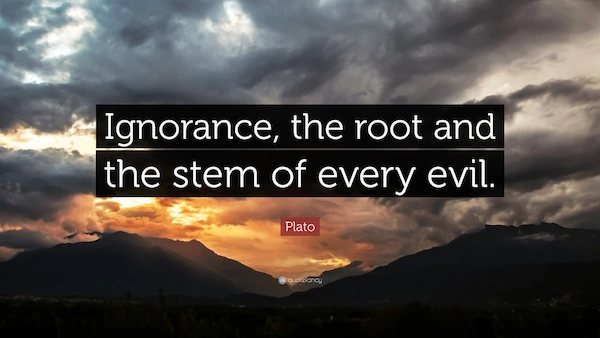
Introduction
The proposition that ignorance lies at the heart of evil has echoed through the corridors of human thought for millennia. This profound concept suggests that our failures of understanding—whether willful or circumstantial—drive the most harmful human behaviors. From the sun-drenched agoras of ancient Athens to the digitally-connected global village of today, this idea has challenged philosophers, theologians, and social scientists to reconsider the very nature of morality and human action.
Ancient Greece: The Cradle of Epistemological Ethics
In the fertile intellectual soil of ancient Greece, the relationship between knowledge and virtue took root as a foundational philosophical concern. Socrates’ assertion that “no one does wrong willingly” represents perhaps the most radical articulation of this position—suggesting that evil actions stem not from malevolent intent but from a fundamental misapprehension of the good.
Socrates’ intellectual heir, Plato, expanded this notion through his theory of Forms, positing that true knowledge entails apprehension of eternal ideals, especially the Form of the Good. His allegory of the cave—where prisoners mistake shadows for reality—serves as both metaphor and warning: those who dwell in ignorance not only fail to perceive truth but actively resist enlightenment when confronted with it. This resistance explains why ignorance persists even when knowledge seems readily available.
Aristotle, while diverging from his teacher in significant ways, maintained that virtuous action requires phronesis (practical wisdom)—suggesting that ethical failures often originate in misunderstanding rather than malice. His concept of hamartia (tragic error) further illuminates how ignorance, rather than villainy, often precipitates catastrophe.
The Stoics later extended this tradition, with Epictetus famously observing that “people are disturbed not by things, but by their judgments about things.” This perspective frames evil as a consequence of false judgments—making knowledge a prerequisite for ethical living.
Eastern Philosophical Perspectives: Ignorance as Cosmic Principle
While Western philosophical traditions were developing in Greece, parallel insights emerged in Eastern thought systems. In Buddhist philosophy, the concept of avidya (ignorance) stands as the first link in the chain of dependent origination—the primary cause of suffering. Ignorance here refers not merely to factual unawareness but to a fundamental misapprehension of reality, particularly regarding impermanence and non-self.
In Hinduism, maya (illusion) and avidya similarly obscure ultimate reality, leading individuals to act based on false perceptions. The Bhagavad Gita characterizes actions performed in ignorance as those done without regard for consequences, capability, or harm.
Confucian thought, while focusing more on social harmony than metaphysics, similarly emphasizes the role of learning and self-cultivation in ethical development. The unlearned person, lacking understanding of li (proper conduct), inevitably disrupts social order through inappropriate behavior.
Medieval Period: Divine Illumination and Spiritual Darkness
As classical philosophy merged with religious doctrine, ignorance took on spiritual dimensions. Augustine of Hippo, drawing from Neoplatonism and Christianity, conceived of evil not as a substance but as a privation—an absence of good paralleling the absence of knowledge. Ignorance became not merely intellectual deficiency but spiritual blindness—a failure to perceive divine truth.
Thomas Aquinas systematized this approach, distinguishing between invincible ignorance (that which cannot be overcome) and vincible ignorance (that which one could and should overcome). This nuanced view recognized that not all ignorance carries equal moral culpability—a crucial distinction in evaluating human action.
Islamic philosophers like Avicenna and Averroes preserved and expanded Greek philosophical insights while incorporating them into Islamic theology. Al-Ghazali’s emphasis on spiritual knowledge (ma’rifah) as distinct from intellectual understanding highlighted that mere factual knowledge without spiritual insight could perpetuate a more dangerous form of ignorance.
Jewish mystical tradition, particularly through Kabbalah, conceptualized evil as emerging from kelipot (shells or husks) that obscure divine light—metaphorically representing how ignorance veils ultimate truth and leads to misguided action.
Renaissance and Enlightenment: Knowledge as Liberation
The Renaissance revival of classical learning reinvigorated interest in education as moral development. Humanists like Erasmus advocated universal education, believing that knowledge could transform character and society. His contemporary Montaigne questioned whether knowledge necessarily produced goodness, yet still maintained that self-knowledge—understanding one’s own ignorance—represented the highest form of wisdom.
The Enlightenment’s embrace of reason as the antidote to superstition and oppression found expression in Kant’s challenge: “Sapere aude” (Dare to know). Kant’s epistemological revolution distinguished between phenomena (appearances) and noumena (things-in-themselves), suggesting that moral evil stems from mistaking subjective perceptions for objective reality.
Spinoza’s Ethics proposed perhaps the most direct link between ignorance and evil, arguing that ignorance enslaves humans to passions, while understanding liberates them to rational action. In his geometric system, evil actions inevitably result from inadequate ideas—a form of cognitive error rather than moral failing.
Modern Perspectives: The Psychology and Sociology of Not-Knowing
Contemporary psychology has illuminated the cognitive mechanisms maintaining ignorance. System 1 and System 2 thinking (as described by Daniel Kahneman) reveals how cognitive biases create persistent blindspots. Confirmation bias, the Dunning-Kruger effect, and motivated reasoning all demonstrate how individuals actively—if unconsciously—perpetuate their own ignorance.
Social epistemology examines how knowledge and ignorance function at collective levels. Miranda Fricker’s concept of “epistemic injustice” highlights how social power structures can systematically deprive certain groups of knowledge or undermine their status as knowers—creating institutionalized forms of ignorance that perpetuate harm.
Charles Mills’ “epistemology of ignorance” similarly explores how dominant groups actively maintain ignorance about oppression to preserve privilege—a form of “white ignorance” that is neither accidental nor innocent but actively constructed.
Digital-age phenomena like filter bubbles, algorithmic curation, and information silos create new mechanisms for enforcing ignorance even amid unprecedented access to information—demonstrating that ignorance persists not despite but because of information abundance when knowledge becomes fragmented and contextless.
Spiritual Dimensions: Ignorance and the Journey to Wholeness
Across diverse spiritual traditions, ignorance represents not merely factual unawareness but fundamental misconception about reality itself. Contemporary spiritual perspectives often integrate psychological insights with traditional wisdom.
- Gnostic and Esoteric Traditions: These frameworks view ignorance (often symbolized as sleep or forgetfulness) as the human condition from which awakening is possible. Gnostic texts portray humans as divine sparks trapped in matter, having forgotten their true nature—a cosmic ignorance requiring gnosis (direct knowledge) for liberation.
- Indigenous Wisdom Traditions: Many Native American, Aboriginal, and other indigenous perspectives emphasize relational knowledge—understanding oneself as interconnected within natural and social ecosystems. Ignorance here manifests as disconnection, with harmful consequences radiating through relationships with all beings.
- Contemplative Practices: Mindfulness traditions across cultures address ignorance through practices designed to penetrate habitual perception. By observing mental processes directly, practitioners recognize how conditioned thinking perpetuates suffering—suggesting that meta-ignorance (not knowing that one doesn’t know) may be more dangerous than simple unawareness.
- Integral Spirituality: Modern integral approaches synthesize developmental psychology with spiritual traditions, proposing that human consciousness evolves through stages, each transcending limitations of previous worldviews. This perspective frames ignorance as developmental—appropriate to one’s current stage but problematic when one becomes fixated rather than continuing to grow.
Practical Applications: Confronting Ignorance in Contemporary Society
The ancient insight connecting ignorance to harm remains urgently relevant today. Educational systems worldwide struggle with defining what constitutes essential knowledge in rapidly evolving information environments. Critical thinking skills—the ability to recognize one’s own ignorance and methodically address it—have become essential survival tools.
Public discourse increasingly recognizes that ignorance is not merely absence but active presence—what philosopher Gaston Bachelard called “epistemological obstacles” that actively resist correction. Scientific communication faces not just information gaps but entrenched misconceptions requiring specific pedagogical approaches.
Social justice movements increasingly frame their work in epistemological terms—challenging not just unjust systems but the ignorance that sustains them. Concepts like “consciousness raising” acknowledge that transformative social change requires addressing cognitive limitations before behavioral ones.
Conclusion: The Eternal Vigilance of Seeking Truth
The proposition that ignorance breeds evil suggests an ethical imperative: the pursuit of knowledge becomes not merely intellectual curiosity but moral responsibility. Yet this ancient insight requires contemporary reinterpretation. In a world of information abundance, the challenge shifts from accessing knowledge to discerning its quality and relevance.
True wisdom may lie not in accumulating information but in cultivating awareness of one’s inevitable ignorance—what philosopher Nicholas of Cusa called “learned ignorance.” This paradoxical approach suggests that acknowledging the boundaries of our understanding may be the beginning of genuine wisdom.
As humanity faces unprecedented challenges—from widespread cognitive decline to artificial intelligence—addressing ignorance in all its forms becomes not merely philosophical concern but existential necessity. The Socratic dictum that “the unexamined life is not worth living” takes on renewed urgency: examined living requires continual vigilance against comfortable ignorance that breeds harm to self, others, and the planet itself.
The journey from ignorance to understanding thus represents humanity’s oldest and most essential quest—one that continues today with stakes higher than ever before.
ARE YOU A VICTIM OF HERD EFFECT?
Review the following statements and check the ones you agree with and consider best aligned with your perspective.
Determine the number of selected boxes and examine the resulting profile.
0: You are totally insensitive to herd effect
1-2: You are poorly affected by herd effect
3-4: You are influenced by herd effect
5-6: You are a victim of herd effect
Further details on herd effect
ARE YOU A CONFORMIST AND HOMOLOGATED PERSON?
Read the following sentences and choose the ones you agree with and find most meaningful.
Count the number of selected boxes and read the associated profile.
0: You are not conformist at all
1-2: You are hardly conformist
3-4: You are quite conformist
5-6: You are totally conformist





